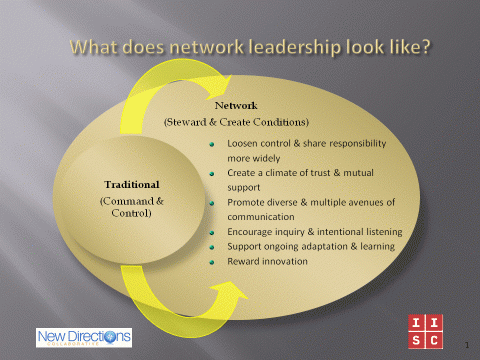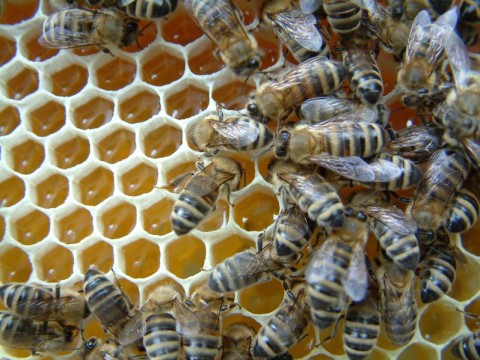Posted in Networks
Want to bridge? DISRUPT!
If you are a frequent reader of our blog you know that I am privileged to be one of the facilitators of the Barr Fellows Network, one of the best network building efforts that I know of. The following is a blog post from the Social Capital Blog, it is written by Pat Brandes, President of the Barr Foundation and the one who conceived the idea.
Leave a commentIISC as Network Beaver
No. It’s not a typo! I know you are used to hearing us talk about the importance of network weavers. But June Holly’s recent post on Network Beavers spoke directly to the heart of what we do here at IISC.
“Network beavers create gatherings that pool network assets, relationships, and energy in a space of dynamic and complex adaptive interaction.”
Yes! IISC is a Network Beaver, this is what we do and what we help you do. We work with you to facilitate and design the spaces that bring networks to life.
Here is June’s Blog Post:
Leave a commentFood Network Solutions

“Agriculture can serve life only if it is regarded as a culture of healthy relationships, both in the field—among soil organisms, insects, animals, plants, water, sun—and in the human communities it supports.”
-France Moore Lappe
Reporting in from the Food Solutions New England convening in Burlington, Vermont. Exciting and challenging conversation happening here about how to knit individual state food planning efforts into a robust regional network that ensures greater availability of and access to “local” food. As part of the proceedings, we have heard a very informative and inspiring presentation by Rich Pirog, now of Michigan State University and previously of the Leopold Center in Iowa. Rich has been part of very impressive work nurturing regional food networks, profiled in a report that served as pre-reading for the gathering.
Some of the highlights from the report worth mentioning here are the implications raised for other regional food networks, including: Read More
Leave a commentIISC and the Paradigm Shift
It is early Easter Sunday morning before the ham and scalloped potatoes go in the oven but after sunrise and meditation. This particular holy day/holiday brims with meaning and metaphor about death and resurrection: the suffering and darkness that always precedes awareness and light, the old giving way to the new, the biblical nature of the times within which we live.
Leave a commentNew Solutions for a Connected Planet
Leave a commentConnection, Attention and Trust
I’m just coming out of a mind bending, heart expanding retreat with Orland Bishop, Rachel Bagby and the Barr Fellows Network. It was one of those experiences that is hard to put into words. For lack of a better word, and I hope Orland doesn’t mind this, it was more like being with a shaman than with a facilitator.
Orland led us in an exploration of intention and attention as he invited us to question how we relate to reality itself. He led with the idea that our relationships – and therefore our human experience – can be radically redefined if we make it our purpose to truly understand the other; and to do it with radical acceptance.
Leave a commentConnection by Design
Two things reminded me of the power of design and physical space this week. First, in a workshop for Juvenile Justice leaders, the 12 participants were seated at three tables. It was a cozy arrangement and the tables were useful for handling the volume of materials they were using. After a morning focused on race, class and culture dialogue skills, we brought the chairs together in a circle in the front of the room to close a segment of the conversation. I asked folks how that arrangement felt and they say “Good!!” There’s nothing like removing physical barriers and enabling everyone to see everyone else easily to foster relational and conversational intimacy!
Leave a commentNetwork Leadership

As I prepare to do a couple of trainings for leadership in multi-stakeholder networks in the New England region (focus being on the skills of facilitation, process design, and managing decision-making), I intend to frame our conversations with some exploration of the differences between traditional organizational leadership and what is required to steward networks towards positive impact. I begin with the presumption that network form and function are chosen strategically for the ability to accomplish something that could not be done at all or as well through other approaches. Whether trying to develop a food system to eliminate food insecurity or change an educational system to yield more equitable opportunities and outcomes, the attraction to a network approach is likely due to a desire for some combination of the following: Read More
8 CommentsNetwork $ustainability
Compared to my post from yesterday, this certainly feels like a big shift, going from the sublime to the tactical. At a recent gathering that I facilitated, members of the steering committee of a food system change initiative, local and regional funders, and members of other organizational networks came together to discuss ideas for ensuring the long-term financial sustainability of the committee’s work around ensuring community food security. We came at this from a few different angles, including a conversation about actual and perceived constraints and challenges to supporting this kind of net work. Here is a taste of what came up, which resonates with what I am hearing in other networks as well: Read More
Leave a commentThe Subtle Power of Networks
“Life is irresistably organizing. Life opens to more possibilities through new patterns of connection.”
M. Wheatley & M. Kellner-Rogers, A Simpler Way

|Photo by Kelly B|http://www.flickr.com/photos/foreverphoto/147660610|
The late David Bohm pointed out the lost potential of quantum physics as he saw it being assimilated by a traditional and very mechanical mindset that wanted to make it another instrument of control, prediction, and quantification. For him the power of the field was much more subtle, qualitative, and lay in the understanding that there is an “implicate order” to reality from which form emerges via our thoughts and efforts to make meaning. From Bohm’s perspective, much of what ails us stems from disorganized thought that has us attaching to form, regurgitating and defending our prejudices, as opposed to thinking that embraces the more creative flow of life. As he once expressed it, “Thought is creating divisions out of itself and then saying that they are there naturally.” Read More
Leave a commentLet’s Learn to Swarm
“From honeybee swarms we’ve learned that groups can reliably make good decisions in a timely matter as long as they seek diversity of knowledge. By studying termite mounds we’ve seen how even small contributions to a shared project can create something useful. Finally, flocks of starlings have shown us how, without direction from a single leader, members of a group can coordinate their behavior with amazing precision simply by paying attention to their nearest neighbor.”
– Peter Miller, The Smart Swarm
2 Comments






